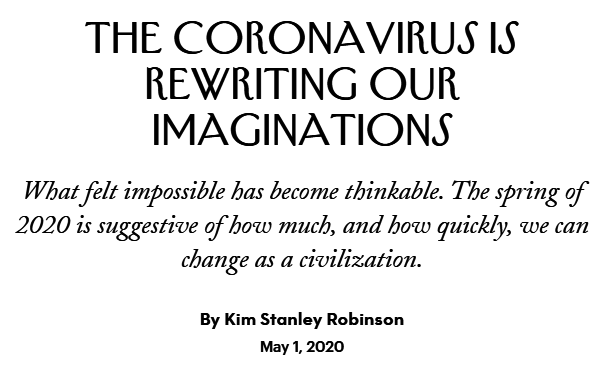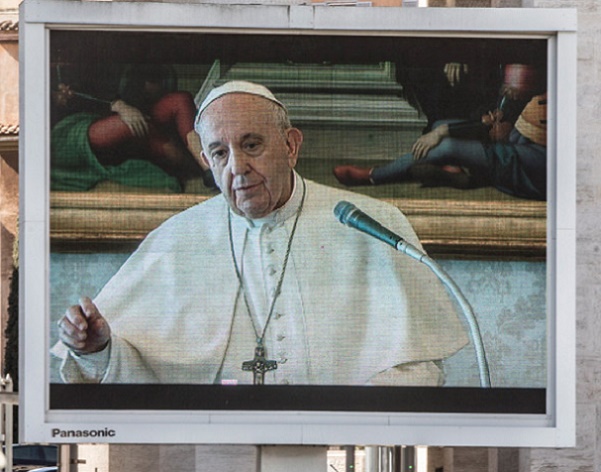Religion meets the coronavirus #13
Sunday, May 24th, 2020[ by Charles Cameron — this last weekend was Eid al-Fitr for Muslims, Memorial Day Weekend for those of us in the USA, we have CDC’s suggestions for places of worship, an Indian Muslim reading of the Gazwa e-Hind, and much more — enjoy! ]
.
The other day, I overheard a Joel Osteen sermon, which included the following:
Have you ever tried something and got the results you wanted and then tried the same thing again and got different results? This happened to Moses in the Bible. They needed water and God told Moses to strike the rock. He struck the rock and water flowed out freely. Another time they needed water again, and God told Moses, “Speak to the rock.” Do you know what Moses did? He went over and struck the rock. He thought, “Hey, it worked last time. It’ll work this time.” But it didn’t. God had a different plan.
The point is that we have to stay open and make adjustments to stay in tune with God’s plan. You can do the same thing the same way you did last time and get different results. It may not be something major, but like Moses, maybe it’s just something small. Sometimes a small tweak, a small adjustment can make a major difference in the outcome.
Joel was suggesting the coronavirus may be a “downtime” while God is installing new software in us, requiring a reboot — and Moses trying the old, successful way when God had installed new software in him was the reason why he failed on the second occasion. Osteen again:
Today, make sure you aren’t doing things just because it’s the way you always did it before. Instead, listen to the voice of the Holy Spirit of God inside. Follow His leading and stay in sync with the wonderful plan He has for you!
**
Still on Christianity, here’s a fascinating excerpt from a longer piece:
Ng Zhi-wen, Novel Coronavirus: Lessons on radical charity from the early Church The Antonine Plague (c 165 – 180)
In the Ancient History Encyclopaedia, John Horgan, an assistant professor of History at Concordia University-Wisconsin, noted: “The effect of the illness was not confined to the military and economy. Marcus Aurelius launched persecutions against Christians who refused to pay homage to the gods which, the emperor believed, in turn angered the gods whose wrath made itself known in the form of a devastating epidemic.
“Ironically the anti-Christian attacks produced the opposite effect amongst the general population.
“Unlike adherents to the Roman polytheistic system, Christians believed in an obligation to assist others in a time of need, including illness. Christians were willing to provide the most basic needs, food and water, for those too ill to fend for themselves.
“This simple level of nursing care produced good feelings between Christians and their pagan neighbours. Christians often stayed to provide assistance while pagans fled. Furthermore, Christianity provided meaning to life and death in times of crisis.”
Self-sacrificing love isn’t limited to Christians — but today as in the time of Marcus Aurelius, we should stand in awe of its heroic beauty. – I’d say the whole of this essay is very well worth your attention.
**
Turning to Islam:
I posted this in Coronavirus meets extremism, but it belongs here as well.. the clear Islamic rhetoric..
Brad Hunter, ISIS, al-Qaida commandeer COVID-19 as a ‘soldier of Allah’ ISIS and al-Qaida claim that the virus and ensuing global pandemic are retribution on the wicked West, courtesy of God.
In typical, flowery al-Qaida style, the death cult released a statement.
“Allah, the Creator, has revealed the brittleness and vulnerability of your material strength,” reads the maniacal missive. “It is now clear for all to see that it was but a deception that could not stand the test of the smallest soldier of God on the face of the Earth.”
**
On a hopefully positive note: Taliban & Kashmir: The taliban reaffirm their interests extending only to the boundaries of the present state of Afghanistan, and their acceptance of India’s claim to Kashmir:
WION, Taliban acknowledges Kashmir internal matter of India after fake tweets After fake tweets emerged attributing to the Taliban, the group has clarified that it Kashmir is India’s internal matter and they don’t support any Pakistani style “Ghazwa-E-Hind” or Holy war against India.
**
Ghazwa-e-Hind??
I wrote several posts about the Ghazwa a while back, noting that the relevant hadith explicitly proposed an army with black banners sweeping victoriously from Khorasan {roughly, Afghanistan] down to Jerusalem, accompanied by a second thrust, the Ghazwa, sweeping from Khorasan again, down into India. Some examples::
One hadith, one plan, one video, and two warnings So many browser tabs, so little time Pakistan’s Strategic Mummery Khorasan to al-Quds and the Ghazwa-e-Hind
Current discussions elsewhere, including that of the Jamiat {see below], seem to take the term more literally as meaning “raid” and thus more general in application than the Khorasan hadith.
**
Islamic Theology, the Jamiat version thereof:
The Print, Everyone misinterprets Ghazwa-e-Hind, but a Jamiat scholar explains what it really means From Pakistan’s JeM to Veena Malik, from Times Now to Tarek Fateh, everyone has been invoking Ghazwa-e-Hind recently.
There’s a phrase that Pakistani militant leaders have used against India for decades – Ghazwa-e-Hind or a holy raid of India. Ghazwa in Arabic implies a war that is guided by faith rather than materialistic or territorial gains and is widely attributed to an Islamic concept derived from the hadiths — a set of sayings by Prophet Mohammad. The phrase is used refer to Muslim warriors conquering the Indian subcontinent. [ .. ]
.
Now, ‘Ghazwa-e-Hind’ has made a noisy return among scholars, security analysts and rabble-rousers, especially after the Narendra Modi government’s action on Article 370 and Pakistan’s isolation in the international theatre. [ .. ]
.
But what has gone largely unnoticed is that the Jamiat Ulema-e-Hind, a leading body of Muslims in India, has already called out the error in this popular interpretation. The group has supported the government’s decision on Kashmir.
.
Maulana Mufti Salman Mansoorpuri, a Jamiat scholar, insisted late last year that Pakistan has been erroneously and mischievously linking the term to their rift with India.
The Maulana, remember, is speaking from within an Indian context: this no doubt influences his interpretation of the situation.
**
China vs India:
When I say I study religions, I mean I study the intersection of cultural anthropology, comparative religion, & depth psychology — areas where depth drivers for surface events are visible — hence my interest in Michael Vlahos‘ work in general and today:
**
Islam in India, it was Eid al-Fitr over the weekend, and that means feeding the poor:
New Indian Exporess, World’s largest Eid feast: Michelin-star chef Vikas Khanna to feed 1.75 lakh people in Mumbai
That’s 175,000 people fed, a lakh being a hundred thousand. And it’s to be done ” while adhering to all guidelines of social distancing”.
**
There’s the cleaning of the Ganges that’s resulting from a drop in the number of cremations In Varanasi:
Deccan Chronicle, Coronavirus caused lockdown is healing the holy Ganga
**
And finally, dated Saturday 23rd, this from the Centers for Disease Control:
CDC< Interim Guidance for Communities of Faith
Enough: I’m exhausted.












